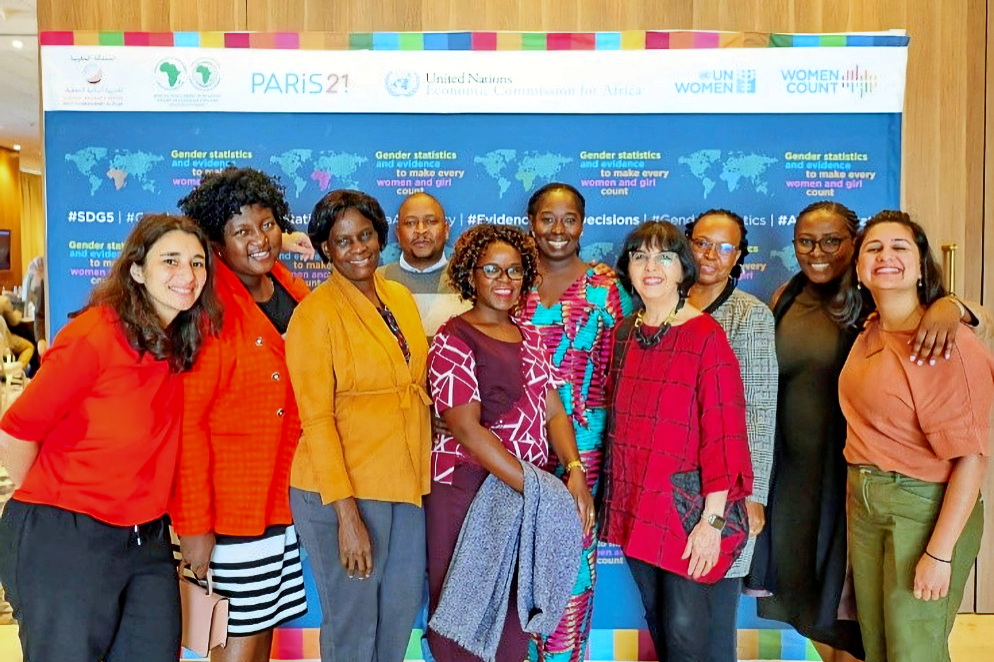Open Data Watch in 2023:
Reflections from the Year
by
the Open Data Watch Team
20 December 2023
As we say farewell to 2023, members of the Open Data Watch team each summed up the year in just one word or phrase. Join us as we delve into the connections our team has made between these chosen expressions and the impactful work that has defined our year. Here’s to the journey behind us and the data-driven possibilities that lie ahead in 2024.
“Innovation”
Jahanara Saeed, Program Director
This year, innovation took center stage at ODW as we unveiled the Gender Data Compass (GDC)—a monitoring and diagnostic tool revealing the status of gender data in 185 countries to strengthen national gender data systems and advance gender equality. This was a new initiative for us—new methodology, new assessors, new website, and new findings. I was most struck by our team’s push to conduct both quantitative and qualitative country assessments. By bolstering our understanding of gender data availability and openness within the broader governance, capacity, and financing capabilities of a country, we have a more nuanced picture of gender data gaps and the solutions needed to fill them. I’m excited about the opportunity to build on this foundation and use the GDC to drive positive change.
“Data Creativity”
Amelia Pittman, Data Visualization and Design Manager
We have approached each facet of our research this year with a sense of creativity, always imagining visualizations to distill complex realities into clear insights for the world to use. The Data Value Chain stands as a classic example, but this year, the BRIDGE Gender Data System Maturity Model was offered to countries as a tool for countries to grasp their statistical landscape and monitor their progress. And the Gender Data Compass boasts an array of visualizations to provide diverse users with the means to undertake a comprehensive exploration of the gender data landscape within countries and around the world.
“3,2,1—Action!”
Deirdre Appel, Communications Adviser
This year we crossed the midpoint of the SDGs. Reflecting on the journey, it’s remarkable to recognize that our organization started our work in 2014, making us as new as these ambitious goals. For me, 2023 marked a shift toward a new realm of doing, building on the strategy and roadmaps set in years prior and moving towards action, commitments, and impact. With consensus established on what needs to be achieved in the data for development space through initiatives like the recently launched Data Action Plan, our focus is on energizing the community, fostering commitments, and accelerating action. And we’re bringing that motivation into 2024 as we gear up for the next UN World Data Forum.
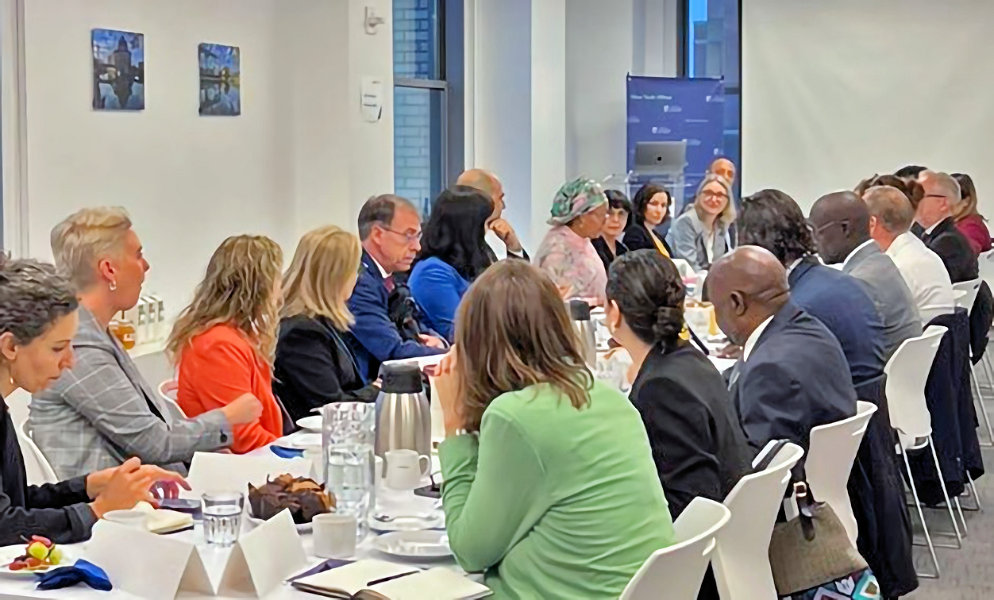
Colleagues in the data for development space are joined by the UN Secretary-General Amina J. Mohammad at the launch of the Data Action Plan at the SDG Summit in September.
“Smart Financing”
Lorenz Noe, Research Manager
The importance of financial resources to support censuses, surveys, trainings, producer-user dialogues, and data portals is always on my mind and this year was no different. In 2023, we focused on how the development data community could do more with less. ODW examined budget transparency for gender data and external ODA in our Gender Data Compass, supported the Clearinghouse for Financing Development Data, and worked on global advocacy efforts around gender data financing, while maintaining our in-house expertise on data financing—all in efforts to achieve smarter financing for data.
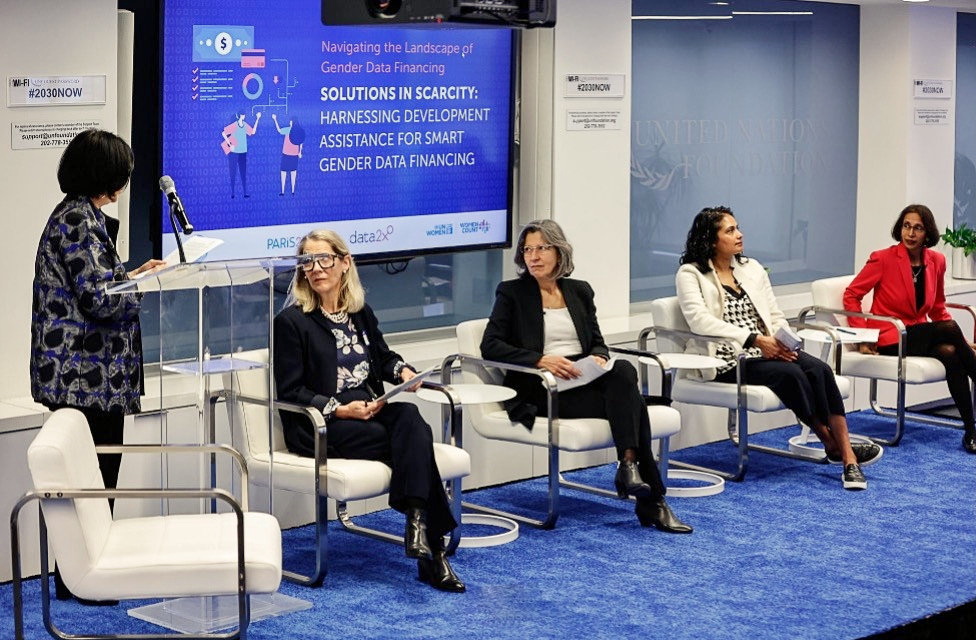
Shaida moderates a panel with leading gender experts from the IMF, World Bank, Gates, and USAID in Washington, D.C. in February as part of the Solutions in Scarcity campaign with UN Women, PARIS21, and Data2X.
“Countries First”
Jamison Henninger, ODIN Manager
A “Countries First” approach is what comes to mind when I think about 2023. This year ODW doubled down on its focus towards impactful country engagements and providing targeted technical assistance to catalyze changes at the country level. This commitment materialized through thorough email exchanges offering advice and guidance, virtual and in-person workshops, and a steadfast dedication to supporting National Statistical Offices (NSOs) directly. Notable country engagements included collaborative efforts with the United Arab Emirates, Uzbekistan, and the Maldives. Simultaneously, ODW spearheaded open data workshops, exemplified by its collaboration with the African Development Bank, with more promising engagements on the horizon. This work underscores ODW’s commitment to effecting change where it matters most—at the country level—building the foundation for a more data-inclusive future.
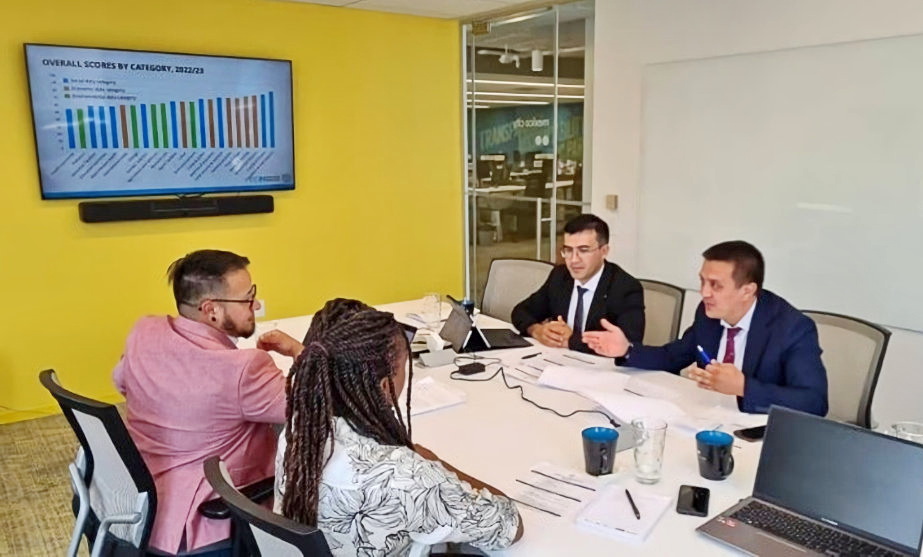
Jamison and Taylor meet with colleagues from Uzbekistan’s national statistical office to discuss their current open data practices and potential improvements.
“From Quantitative to Qualitative”
Tawheeda Wahabzada, Data and Policy Specialist
For me 2023 marked an exciting journey of exploration, delving into qualitative data of national statistical offices and the systems that drive them. Our mission extended to unraveling the threads of policy frameworks that empower these offices to generate crucial gender data. Within the framework of the Gender Data Compass, we crafted a unique set of qualitative indicators, examining the support offered by statistical laws, national strategies for statistical development (NSDSs), and the coordination mechanisms in place for gender data production. Additionally, we investigated the role of gender ministries, assessing their contributions through national gender policies and mandated activities. These indicators, inspired by our collaborative BRIDGE Tool with Data2X, represent an innovative effort, involving a thorough analysis of accessible documents. As we venture into the new year, I am anticipating feedback from NSOs and partners, fostering a collaborative spirit to enhance our methodologies.
“Inclusivity”
Taylor Hadnot, Research Analyst
A significant part of Open Data Watch’s country work is to advocate for statistical systems to collect and publish more inclusive data for their national statistics. This call extends beyond the countries we work with and into our own way of work. That is why for Open Data Inventory 2022/23 we updated our methodology to expand the sources of data we use to conduct our assessments. In our endeavor to monitor the progress of the SDGs, we expanded country coverage by including SDG portals as data sources for all countries. ODIN indicators are meant to be representative of the types of data a national statistical system produces because the goal of our engagements and advocacy is not towards perfection, but towards progress. Though many SDG indicators were already identified as substitute indicators for ODIN indicators, the further inclusion of data from country SDG portals instead of only data found on the NSO website or NSO-linked government sites is reflective of this aim. Not only did this change allow for countries to see a fuller representation of the data they make publicly available, but also, we were also honored this year by the member countries and international observers of the Inter-agency and Expert Group on SDG Indicators (IAEG-SDGs) to have the ODIN coverage score be adopted as one component of SDG indicator 17.18.1. Looking towards 2024, I am excited to see the influence and results of an increasingly more inclusive and representative open data global ecosystem.
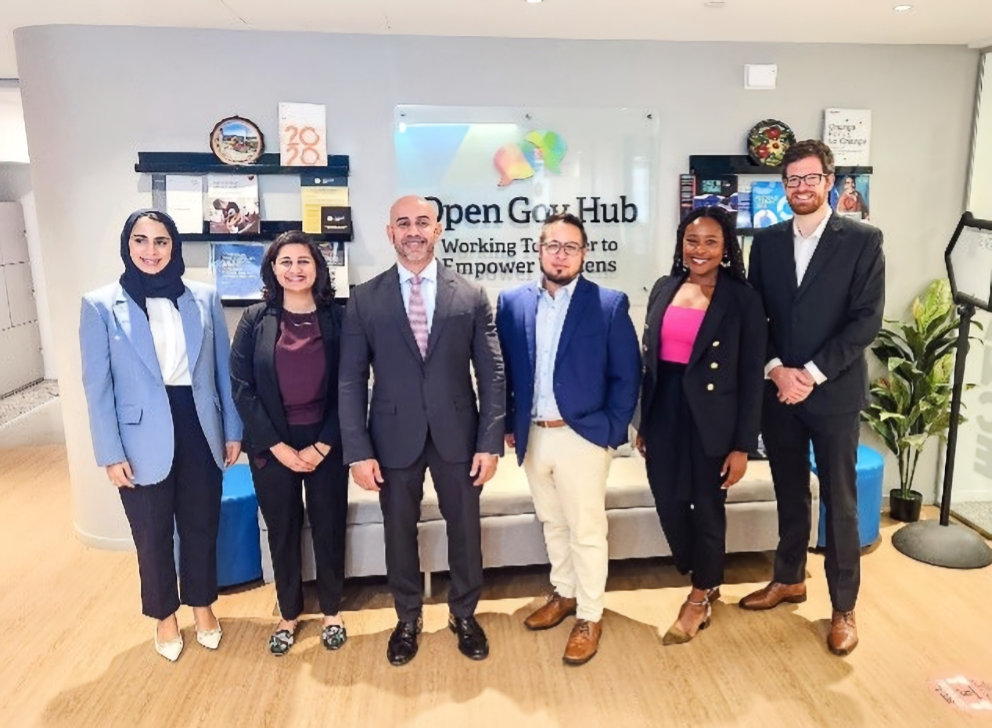
Jahanara, Jamison, Taylor, and Lorenz welcome the colleagues from the United Arab Emirates national statistical office for an open data workshop in Washington, D.C.
“Better data matter, behind the acronyms”
Aelim Chi, Program Assistant
As a recent addition to the ODW team, I recall my initial experience in a team meeting just a few months ago. The discussion was a whirlwind of acronyms hearing things like “let’s loop in GDN, UNSD, AGI, UNECA, and Data2X, with plans to involve D4D, UNFPA, IDRC, PARIS21, SIPA, and EM2030 in later consultations, all while ensuring adherence to SDG 17.18.1.” As a newcomer, my primary challenge was deciphering this alphabet soup, reminiscent of the complex jargon I had encountered in the realms of cryptocurrency and artificial intelligence. Reflecting on those early days in November, it dawned on me that familiarity with these acronyms was a telltale sign of immersion in the data for development space. For those less acquainted, a simple translation could mean a collective effort to pursue a world where data truly matters and serves as a catalyst for positive change. A mission to give voice through data of individuals affected by gender inequality, economic hardships, political agendas, and social injustices. As the year closes, I am moving away from decoding acronyms and towards shaping the future of data alongside ODW.
“Growing through Collaboration Expansion”
Francesca Perucci, Director of Policy and Partnerships
As the year concludes, I find myself reflecting on my new role as the Director of Policy and Partnerships. Joining this collaborative and dedicated team in August has been a source of inspiration and excitement for me after the UN Statistics Division. Looking ahead, I am eager to contribute to the expansion of our competencies, particularly in the realm of capacity development, building on the foundation of open data. But my role is not just about maintaining what we excel at but also venturing into new territories. I am excited about the prospect of forging partnerships, and one area of keen interest is collaborations with topics like citizen-generated data. In the coming year, I see great potential for ODW to amplify its influence and effectiveness in these new areas. I am honored to be a part of this journey and look forward to the opportunities and challenges that the new year will bring.
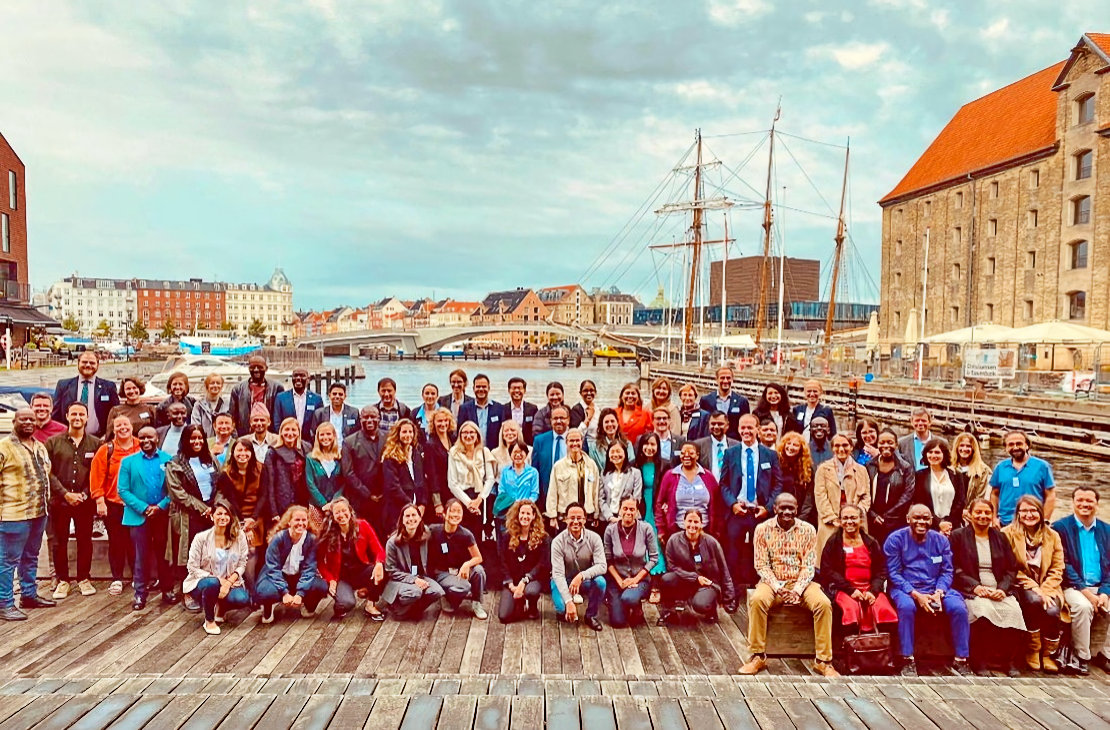
Francesca joins UN Statistics Division Citizen-Generated Expert Group meeting in Copenhagen in October.
“Tech in Service to Sustainable Development”
Martin Getzendanner, Media & Technology Advisor
At Open Data Watch, we take pride in being a small but nimble organization. Behind the scenes, we handle all aspects of technology, information resrouces, and network management in-house. This hands-on approach allows us to keep our systems both running smoothly and always up-to-date with the latest technology. We’ve garnered invaluable experience in building and maintaining the Open Data Watch website in tandem with ODIN, and this knowledge has been instrumental as we venture into new territory with the development of the Gender Data Compass website. While the work may be challenging, it’s a testament to ODW’s commitment to excellence and self-reliance in navigating the evolving landscape of data for development. The work this year to stay ahead of the quick pace of technological advancements hopefully lays a solid foundation for what looks to be a challenging 2024.
“Quality control”
Eric Swanson, Director of Research
With the dynamic landscape of emerging technologies and tools, quality control and methodological rigor may not be the flashiest terms to highlight our 2023 work program, but they remain the cornerstone for our work at Open Data Watch. As the Director of Research, I am committed to upholding rigorous standards that ensure the consistency, reproducibility, and relevance of all our products, such as the Gender Data Compass and its underlying methodology. The selection of the ODIN coverage indicator as an SDG indicator for 17.18.1 measuring statistical capacity is another affirmation of the care with which we approach quality control, ensuring the reliability and credibility of the data that underpin our initiatives.


